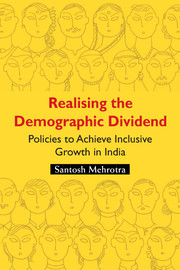Book contents
- Frontmatter
- Contents
- List of Tables and Figures
- Preface
- Acknowledgements
- Part 1 Growth, Employment and Inclusion
- Chapter 1 Capability-centred Approach to Inclusive Growth: Theoretical Framework and Empirical Reality
- Chapter 2 Sustaining Economic Growth
- Chapter 3 Ensuring Higher Agricultural Growth and the Revival of Rural India
- Chapter 4 Addressing the Employment-related Paradoxes of Economic Growth
- Chapter 5 Public Finance: Increasing Fiscal Capacity
- Chapter 6 Skill Development: Finding New Financing Mechanisms to Take Vocational Education and Training to Scale
- Chapter 7 A Common Platform for Skill Development: Implementing the National Skills Qualification Framework
- Part 2 Human Capital Formation
- Part 3 Building a System of Social Protection
- Part 4 Governance
- Index
Chapter 1 - Capability-centred Approach to Inclusive Growth: Theoretical Framework and Empirical Reality
from Part 1 - Growth, Employment and Inclusion
Published online by Cambridge University Press: 05 June 2016
- Frontmatter
- Contents
- List of Tables and Figures
- Preface
- Acknowledgements
- Part 1 Growth, Employment and Inclusion
- Chapter 1 Capability-centred Approach to Inclusive Growth: Theoretical Framework and Empirical Reality
- Chapter 2 Sustaining Economic Growth
- Chapter 3 Ensuring Higher Agricultural Growth and the Revival of Rural India
- Chapter 4 Addressing the Employment-related Paradoxes of Economic Growth
- Chapter 5 Public Finance: Increasing Fiscal Capacity
- Chapter 6 Skill Development: Finding New Financing Mechanisms to Take Vocational Education and Training to Scale
- Chapter 7 A Common Platform for Skill Development: Implementing the National Skills Qualification Framework
- Part 2 Human Capital Formation
- Part 3 Building a System of Social Protection
- Part 4 Governance
- Index
Summary
A basic premise of the capability approach is that focusing development analysis and policy mainly on increasing income and material wealth is misguided. Although almost every person would want to enjoy a higher income, one's state of well-being is determined also by policies that expand one's capabilities, which in turn affect one's income and functioning. There is an interactive relationship (synergy) between income growth and the expansion of capabilities. Our model of synergy leads to a set of recommendations which explicitly integrate economic and social policies, and which are associated in the economics literature with different heterodox approaches (Post-Keynesian, Evolutionary, Structuralism and Transformational Growth).
Mainstream economics is insufficient as a heuristic device to allow us to understand the main intricacies and complexities concerning the outcomes of development strategy. Mainstream economics, with its theoretical foundations in utilitarianism (see Sen, 1985; Nussbaum, 2001) and its limited success so far in unbundling the family or examining and interrogating intra-household allocation of resources, has been the basis for both macro-economic and social policies. Moreover, mainstream economics has been at the core of much of public policies since the 1980s, with extremely mixed results, as the experience of Latin American and Sub-Saharan developing economies demonstrates. Most Asian economies performed very differently over this same period, as they adopted policies not consistent with mainstream economics, or prescriptions emanating from their adherents (Rodrik, 2002). Therefore, there is a need for an alternative framework for development, one founded on human development and the capability approach.
The work of Amartya Sen, Martha Nussbaum and others on human capability (Sen, [1985] 1995; Nussbaum, 2001) resulted in the gradual emergence of a human development paradigm – partly manifested in the Human Development Reports. In fact, ‘human development’ became an overly popular term after 1990 – popular even with the international financial institutions, which reorganised departments and then named some of them Human Development networks. However, the consensus within which the term ‘human development’ was used remained founded in neo-classical economics, and the macro-economic policies that emerged remained bound within it.
An alternative framework for policies is necessary, as the theoretical basis of the consensus (i.e., neo-classical economics) was weak (Sen, 1982; Amsden, 1989; Nell, 1998), and as the philosophical foundation of the theory on which it is based was even weaker (see Sen, 1985).
- Type
- Chapter
- Information
- Realising the Demographic DividendPolicies to Achieve Inclusive Growth in India, pp. 3 - 47Publisher: Cambridge University PressPrint publication year: 2015



